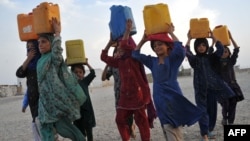Some 770 million people do not have clean water and 2.5 billion more lack basic sanitation. If the status quo continues, by the year 2025, half of the world’s population, around 3 billion people will be living under water-stressed conditions, causing an increase in hunger, disease, preventable death and strife.
According to United Nations Associate Administrator of the UN Development Programme, Rebeca Grynspan, “not only is the world experiencing explosive growth in the demand for water resources, but water waste and pollution increasingly threaten the integrity of aquatic and agro ecosystems vital for life and food security.”
To help address this issue, the United Nations has declared 2013 The International Year of Water Cooperation. At a recent conference, held in Tajikistan’s capital Dushanbe, U.S. Deputy Assistant Secretary for the Bureau of Oceans and International Environmental and Scientific Affairs, Daniel Reifsnyder stated that there is no alternative to global and regional cooperation on water.
“As demands rise and supplies decline – as variability increases – there will be conflicts among competing uses and among competing users. There will be legitimate disputes over who has access, and over when and how water is used. There will also be less room for mistakes and a greater need to get the most value out of every drop.”
One good example of a mechanism that supports cooperation on shared waters is the Shared Waters Program, or SWP, at the United Nations Development Program. This is a multi-donor platform for establishing new, or strengthening existing, regional mechanisms for advancing cooperation on shared waters, said Deputy Assistant Secretary Reifsnyder.
The United States is currently supporting this program in a number of the world’s river basins, laying the groundwork for shared management. Once the groundwork has been completed, traditional development assistance will support the next steps in developing and realizing the program.
Still, half of all international river basins lack any cooperative management framework. That must change.
“There really is no choice,” said Deputy Assistant Secretary Reifsnyder. “The history here is clear – without cooperation economic growth is slower and insecurity grows. Through cooperation, communities and countries can fully realize the multiple benefits of shared water resources, and work toward a more secure water future.”
According to United Nations Associate Administrator of the UN Development Programme, Rebeca Grynspan, “not only is the world experiencing explosive growth in the demand for water resources, but water waste and pollution increasingly threaten the integrity of aquatic and agro ecosystems vital for life and food security.”
To help address this issue, the United Nations has declared 2013 The International Year of Water Cooperation. At a recent conference, held in Tajikistan’s capital Dushanbe, U.S. Deputy Assistant Secretary for the Bureau of Oceans and International Environmental and Scientific Affairs, Daniel Reifsnyder stated that there is no alternative to global and regional cooperation on water.
“As demands rise and supplies decline – as variability increases – there will be conflicts among competing uses and among competing users. There will be legitimate disputes over who has access, and over when and how water is used. There will also be less room for mistakes and a greater need to get the most value out of every drop.”
One good example of a mechanism that supports cooperation on shared waters is the Shared Waters Program, or SWP, at the United Nations Development Program. This is a multi-donor platform for establishing new, or strengthening existing, regional mechanisms for advancing cooperation on shared waters, said Deputy Assistant Secretary Reifsnyder.
The United States is currently supporting this program in a number of the world’s river basins, laying the groundwork for shared management. Once the groundwork has been completed, traditional development assistance will support the next steps in developing and realizing the program.
Still, half of all international river basins lack any cooperative management framework. That must change.
“There really is no choice,” said Deputy Assistant Secretary Reifsnyder. “The history here is clear – without cooperation economic growth is slower and insecurity grows. Through cooperation, communities and countries can fully realize the multiple benefits of shared water resources, and work toward a more secure water future.”






